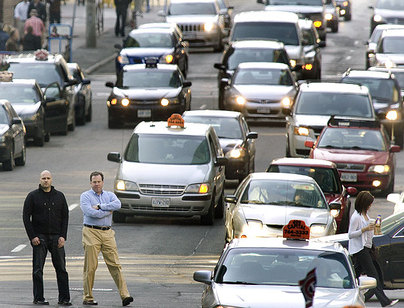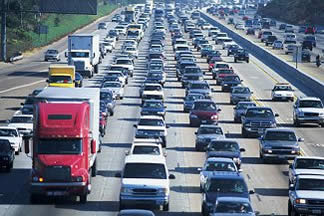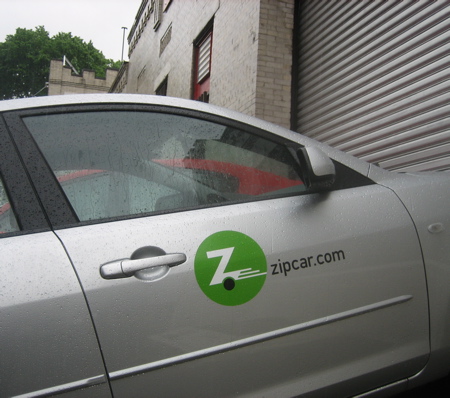|
|
|||||||||||||||||||||||||||||||
|
Ride Sharing
Avoiding GridlockBy Charles Moffat - 2008. When I was finishing highschool years ago I ended up switching to a different highschool so I could finish faster, but in order to do so I needed daily rides to and from a school that was two towns over. A kind retired bank teller ended up giving me daily rides to the new highschool and either her or my parents drove me back home. If my parents three cars it might have been possible for me to drive there, but that wasn't the case. So instead we made arrangements for me to rideshare and help pay the price of gasoline. Sometimes we're just forced by circumstances to consider alternative transportation. With the current high prices of gasoline (it was $1.22 at Esso yesterday) and skyrocketing oil prices that are just shy of $120/barrel many people are rethinking their "need" for a single person to drive a four-door car to every work day. We all need to get to work, and we need to be on time. For many of us public transportation is too slow and timing it can be a problem. Gridlock due too many cars on the road certainly doesn't help either. So the solution is to find someone who works the same time as you do and is willing to car pool. But how do you find such people? Web-based ride-sharing service PickupPal.com, Allostop.ca and other websites like Craigslist or Kijiji seems to be offering solutions. Do you remember being trapped in bumper-to-bumper traffic on an overpass, forced to watch other vehicles moving east and west on a less congested highway? Maybe you were stuck there for half an hour. And you realize that most of the cars whizzing by are carrying just one person. What a waste you think. Many of us feel powerless about climate change and the environment because we NEED to get to work somehow, but the answer is staring you right in the face and is in the dead silence of your car as you drum the steering wheel in boredom.
John Stewart, an Internet entrepreneur, was caught in that exact situation and had a brain spark. What if "ridesharing" could be made easy? What if people could arrange to catch rides with each other through an online service with the social networking flavour of a Facebook and the transactional elegance of an eBay? Plus it came easy for him, being the son of Christine Stewart, federal environment minister for two years under the Liberal government of Jean Chrétien, the same minister who signed in Kyoto. Stewart saw an opportunity to empower the public by packing more people into fewer cars, ultimately resulting in lower CO2 emissions. Thus PickupPal Online Inc. (www.pickuppal.com) was born. Together with friend and past business partner Eric Dewhirst, and the two started hammering out a service that was simple to use, effective at matching drivers and riders, and flexible enough to accommodate the different preferences and needs of users. Kind of like a dating service for car drivers, but without the bad taste in your mouth after meeting a sloppy kisser. "It's all profile-based," explains Stewart, pointing out that the company's user agreement is very similar to that found on an Internet dating site. Members can, in many respects, set their own rules of engagement. "We've tried to work on a trust and openness basis. But if you want to ride with a woman only, put that in your profile and we'll only match you with a woman. Ultimately we ask users to be aware and ask the right questions." Dewhirst says the business model is simple. Drivers can, if they want, negotiate some compensation for providing a ride. If, for example, a driver charges $20 for a ride from Toronto to Montreal, PickupPal collects a 7 per cent commission. "They pay us through an online account, essentially through PayPal," explains Dewhirst. "It's all based on trust and goodwill. If you want to give a ride for free, then we get 7 per cent of zero." Still, drivers have an incentive to charge and pay the commission because it allows them to post rider feedback and get a site rating that, presumably, can help them pull in more riders. No pay, no rating. The idea is to build a large global community of loyal users. Even if only a fraction pay a commission, it could still mean millions of dollars in revenues for PickupPal. The service, called Eco-Rideshare, seems to be catching on. Only launched in January, the site has been growing through word-of-mouth and advertising on Facebook. University students, no surprise, are gravitating toward the service. "We're rocking," says Stewart, who took on the roll of company chief executive. "We've had days where we sign up almost a thousand people." It's not that there's a shortage of rideshare sites on the Internet. One of the largest sites in Canada is Carpool.ca, which thousands of people and hundreds of employers and universities use to organize carpools. Others are more regional, such as Jack Bell Ride-Share in British Columbia, Allostop.ca in Quebec, and The RideShare Co., which serves the northeast United States. The public can also hitch a ride using local classified sites such as www.kijiji.ca, which has a presence in more than 60 cities across Canada. But PickupPal is trying to raise the bar. For one, it has a slick look and nice feel. And like an eBay or Facebook, the site was designed to be globally reaching yet locally relevant, using Google Maps to provide driving routes. Both Stewart and Dewhirst are experts on geographic information systems, and are no strangers to running Internet businesses developed around that specialty. They co-founded Lasso, a spatial search engine financially backed by Rogers Communications and Shaw Communications, which helped people find local content and products on the Internet. Lasso was sold to Yahoo Inc. five years ago and today forms a key part of the Web giant's local search product. Unlike Lasso however it looks like ride sharing websites are here to stay and there is a lot of demand for them. PickupPal.com and Allostop.ca are just a drop in the bucket compared to all the other websites already out there. There are plenty of other ride sharing services available on the internet. Just type in your city's name, the words ride share and chances are there is a local service already operating.
Zip CarsFor those of us who can't afford to buy a car there is also the very affordable zip car service, which allows people to rent cars by the hour, and most of the cars are small fuel-efficient vehicles or hybrids. So whether you're looking for a MINI, a pickup or a van for moving furniture, a Prius hybrid or whatever you need you have the option to save both money and the environment by driving a fuel efficient car without the cost of purchasing a more expensive hybrid. Zip cars are now available in 40 North American cities and are quickly spreading, having a winning business model that users find both convenient and cheap.
|
|
||||||||||||||||||||||||||||||
|
Website Design + SEO by designSEO.ca ~ Owned + Edited by Suzanne MacNevin | |||||||||||||||||||||||||||||||



